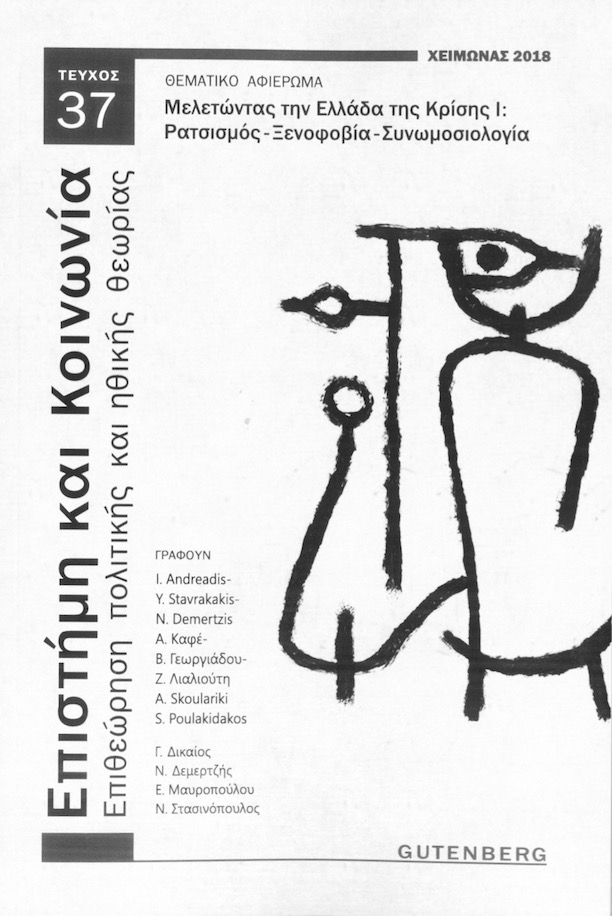Conspiracy theories before and after the Greek crisis: Discursive patterns and political use of the “enemy” theme

Περίληψη
Conspiracy theories have been associated to a paranoid way of thinking; however they are not always marginal and utterly irrational. Conspiracist narratives reflect rival strategies of interpretation, and can have a real impact on the social and political praxis. More than factual accuracy, I suggest that what distinguishes a conspiracy theory is a type of discourse, its key features being: suspicion, intentionality, personification, speculation and denunciation.
This paper examines conspiracy theories that dominated Greek public discourse before and after the economic crisis of the years 2010s, particularly those introduced by political actors as a means of political persuasion and mobilisation. Greek political culture and the discredit of the political system since 2010 led to frequent expressions of distrust towards political elites and foreign “powers”. My analysis focuses on the acceptability of conspiracy theories in relation with social representations, dominant stereotypes and widely shared interpretative schemata.
The following cases of conspiracy theories are discussed: a) the wildfires that ravaged large parts of Greece in 2007, supposedly set by “foreign agents”; b) the alleged assassination plot in 2008-2009 against the PM Karamanlis by Western / US secret services; c) the conspiracy theories attributing the economic crisis to a deliberate foreign plot against Greece. The paper examines in particular the attribution of blame to presumed “enemies”, in line with nationalist discursive themes and stereotypes.Λεπτομέρειες άρθρου
- Πώς να δημιουργήσετε Αναφορές
-
Skoulariki, A. (2018). Conspiracy theories before and after the Greek crisis: Discursive patterns and political use of the “enemy” theme. Επιστήμη και Κοινωνία: Επιθεώρηση Πολιτικής και Ηθικής Θεωρίας, 37, 73–108. https://doi.org/10.12681/sas.14656
- Ενότητα
- Άρθρα

Αυτή η εργασία είναι αδειοδοτημένη υπό το CC Αναφορά Δημιουργού – Μη Εμπορική Χρήση – Παρόμοια Διανομή 4.0.
Οι Συγγραφείς που δημοσιεύουν εργασίες τους σε αυτό το περιοδικό συμφωνούν στους παρακάτω όρους:- Οι Συγγραφείς διατηρούν τα Πνευματικά Δικαιώματα και χορηγούν στο περιοδικό το δικαίωμα της πρώτης δημοσίευσης ενώ ταυτόχρονα τα πνευματικά δικαιώματα της εργασίας προστατεύονται σύμφωνα με την άδεια Creative Commons Αναφορά Δημιουργού - Μη Εμπορική Χρήση - Παρόμοια Διανομή 4.0 Διεθνές , που επιτρέπει σε τρίτους - αποδέκτες της άδειας να χρησιμοποιούν την εργασία όχι για εμπορικούς σκοπούς, με την προϋπόθεση της διατήρησης των διατυπώσεων που προβλέπονται στην άδεια σχετικά με την αναφορά στον αρχικό δημιουργό και την αρχική δημοσίευση σε αυτό το περιοδικό και με διανομή τυχόν τροποποιήσεων υπό την ίδια άδεια όπως και το πρωτότυπο.
- Οι Συγγραφείς μπορούν να συνάπτουν ξεχωριστές, και πρόσθετες συμβάσεις και συμφωνίες για την μη αποκλειστική διανομή της εργασίας όπως δημοσιεύτηκε στο περιοδικό αυτό (π.χ. κατάθεση σε ένα ακαδημαϊκό καταθετήριο ή δημοσίευση σε ένα βιβλίο), με την προϋπόθεση της αναγνώρισης και την αναφοράς της πρώτης δημοσίευσης σε αυτό το περιοδικό.
- Το περιοδικό επιτρέπει και ενθαρρύνει τους Συγγραφείς να καταθέτουν τις εργασίες τους μέσω διαδικτύου (π.χ. σε ένα ακαδημαϊκό καταθετήριο ή στους προσωπικές τους ιστοσελίδες) πριν και μετά από τις διαδικασίες της δημοσίευσης, καθώς αυτό μπορεί να οδηγήσει σε παραγωγική ανταλλαγή ιδεών και σκέψεων καθώς επίσης και σε γρηγορότερη και μεγαλύτερη χρήση και ευρετηρίαση της δημοσιευμένης εργασίας (See The Effect of Open Access).


